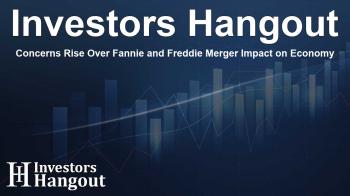Concerns Rise Over Fannie and Freddie Merger Impact on Economy

Potential Merger Raises Red Flags
Economist Peter Schiff recently highlighted significant concerns regarding a potential merger between two major mortgage finance entities, Federal National Mortgage Association (FNMA), known as Fannie Mae, and the Federal Home Loan Mortgage Corp (FMCC), commonly referred to as Freddie Mac. Schiff believes that this merger may introduce risks even more severe than those that sparked the Great Financial Crisis of 2008.
Concerns Of A Monopoly Forming
Schiff's primary argument revolves around the idea that collapsing Fannie Mae and Freddie Mac into one entity could monopolize the U.S. mortgage market. He suggests that this newly formed monopoly could leverage government guarantees, thereby transforming high-risk mortgages into securities with the same backing as U.S. Treasury Bonds.
Such a transformation could heavily distort the risk assessment in the housing market. Schiff points out that this situation may lead to a moral hazard greater than any seen prior to the financial crash in 2008. When financial institutions believe that they won't face severe repercussions for excessive risk-taking, the entire market can suffer.
Trump's Vision of A Unified Listing
Adding to the conversation, former President Donald Trump hinted at the idea of merging the two companies under a singular listing, with the working title as “MAGA.” He suggests that a consolidated Fannie and Freddie management might streamline operations and potentially benefit the mortgage market.
Mixed Reactions Among Economists
Contrasting Schiff’s perspective, hedge fund manager Bill Ackman supports the merger, arguing that it could provide necessary cost synergies to help lower mortgage rates. He believes that having a single entity could also reduce the overall regulatory oversight burden, as there would only be one institution under the Federal Housing Finance Agency (FHFA) regulations.
Ackman, who has prominently held shares in both Fannie Mae and Freddie Mac for over a decade, also promotes the idea of ending their Federal conservatorship. He argues that doing so would allow both companies to operate more efficiently and freely in a competitive market.
Market Response to the Potential Merger
Recently, the stock prices of Fannie Mae and Freddie Mac exhibited a significant uptick following speculation surrounding the merger. On that particular day, Fannie Mae shares rose by approximately 15% to trade at around $11.49, while Freddie Mac saw a 13% increase, reaching about $9.03. Some experts attribute this boost to positive consumer sentiment and the anticipation of a historic public offering as part of the potential restructuring.
The Bigger Picture for Mortgage Finance
The dialogue about merging these mortgage giants also invites broader discussions regarding the sustainability of housing finance in the United States. As the market evolves, of particular interest is how combined assets and liabilities might affect future lending practices and home affordability.
Investors and politicians alike will be closely watching how the landscape of mortgage finance transforms in response to these discussions. As uncertainties loom, many are advocating for transparency and responsible market practices to avert another crisis.
Frequently Asked Questions
What is the concern surrounding the Fannie and Freddie merger?
Peter Schiff warns that a merger could foster a monopoly in the mortgage market, leading to increased moral hazards.
Who is supporting the merger?
Hedge fund manager Bill Ackman supports the merger, citing potential cost benefits and greater efficiency.
How did the market react to the merger news?
Following the discussions about the merger, stocks for both Fannie Mae and Freddie Mac saw significant increases in their prices.
What risks does Peter Schiff associate with the merger?
Schiff believes that the merger could amplify moral hazards by allowing risky mortgages to become comparable to stable government securities.
What would happen to oversight if the merger occurs?
With a merger, it is suggested that there would be reduced government oversight needs, as only one institution would fall under the regulation of the FHFA.
About The Author
Contact Dominic Sanders privately here. Or send an email with ATTN: Dominic Sanders as the subject to contact@investorshangout.com.
About Investors Hangout
Investors Hangout is a leading online stock forum for financial discussion and learning, offering a wide range of free tools and resources. It draws in traders of all levels, who exchange market knowledge, investigate trading tactics, and keep an eye on industry developments in real time. Featuring financial articles, stock message boards, quotes, charts, company profiles, and live news updates. Through cooperative learning and a wealth of informational resources, it helps users from novices creating their first portfolios to experts honing their techniques. Join Investors Hangout today: https://investorshangout.com/
The content of this article is based on factual, publicly available information and does not represent legal, financial, or investment advice. Investors Hangout does not offer financial advice, and the author is not a licensed financial advisor. Consult a qualified advisor before making any financial or investment decisions based on this article. This article should not be considered advice to purchase, sell, or hold any securities or other investments. If any of the material provided here is inaccurate, please contact us for corrections.

